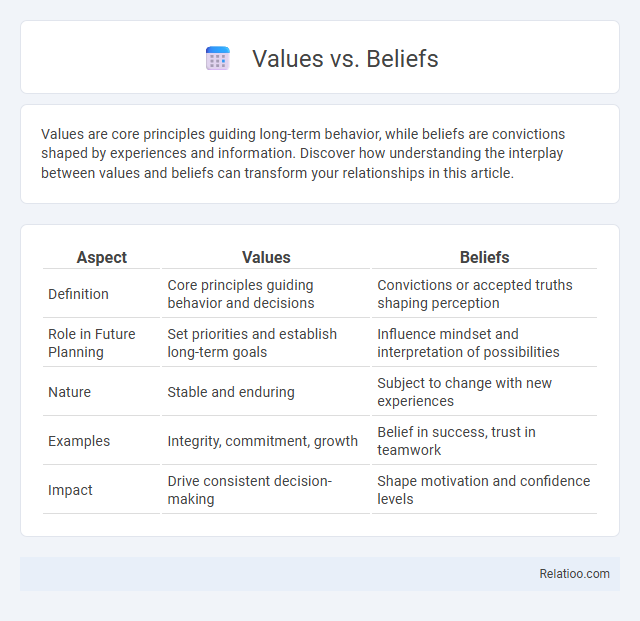Values are core principles guiding long-term behavior, while beliefs are convictions shaped by experiences and information. Discover how understanding the interplay between values and beliefs can transform your relationships in this article.
Table of Comparison
| Aspect | Values | Beliefs |
|---|---|---|
| Definition | Core principles guiding behavior and decisions | Convictions or accepted truths shaping perception |
| Role in Future Planning | Set priorities and establish long-term goals | Influence mindset and interpretation of possibilities |
| Nature | Stable and enduring | Subject to change with new experiences |
| Examples | Integrity, commitment, growth | Belief in success, trust in teamwork |
| Impact | Drive consistent decision-making | Shape motivation and confidence levels |
Understanding Values and Beliefs
Values represent core principles that guide behavior and decision-making, often reflecting what individuals or cultures deem important, while beliefs are convictions or acceptance that certain ideas or statements are true, shaping perceptions and attitudes. Understanding values and beliefs involves recognizing their deep influence on identity, motivation, and social interactions, as values tend to be more stable and overarching, whereas beliefs can be more specific and subject to change. Value alignment occurs when an individual's or organization's actions and goals are consistent with their core values, fostering authenticity, trust, and meaningful connections.
Core Differences Between Values and Beliefs
Values represent fundamental principles or standards that guide behavior and decision-making, such as honesty or respect, while beliefs are convictions or acceptance that certain ideas or statements are true, often shaped by personal experiences or cultural influences. Value alignment occurs when individual or organizational values correspond, promoting consistency and harmony in actions and goals. The core difference lies in values being enduring ideals influencing choices, whereas beliefs are specific thoughts or assumptions about reality or concepts.
The Origins of Values and Beliefs
Values originate from cultural, social, and familial influences shaping individual priorities and guiding behavior, while beliefs stem from acquired knowledge and personal experiences creating mental frameworks for interpreting reality. Both values and beliefs develop through early socialization, education, and significant life events, forming the foundation for decision-making and identity. Value alignment occurs when personal principles resonate with organizational or collective values, enhancing motivation and cohesion.
How Values Shape Behavior
Values serve as core principles guiding individual and organizational decisions, directly influencing behavior by establishing priorities and standards. Beliefs underpin these values by shaping perceptions and interpretations of experiences, which reinforce consistent behavioral patterns. Value alignment ensures coherent actions within groups by harmonizing individual values with collective goals, fostering trust and collaborative effectiveness.
The Role of Beliefs in Decision-Making
Beliefs serve as the cognitive foundation driving individual decision-making by shaping perceptions and interpretations of information. They influence preferences and priorities, guiding choices that align with personal or organizational values. Understanding the interplay between beliefs and values is crucial for achieving value alignment, ensuring coherent and consistent decisions.
Cultural Influences on Values and Beliefs
Cultural influences play a significant role in shaping your values and beliefs by embedding shared norms, traditions, and practices that guide behavior and decision-making. Values represent deeply held principles influenced by cultural context, while beliefs are convictions often derived from cultural narratives and experiences. Value alignment occurs when your personal principles resonate with the cultural values of a group, fostering cohesion and mutual understanding.
Changing Values vs. Challenging Beliefs
Changing values often involves a significant shift in what individuals consider important or worth pursuing, influencing their priorities and behaviors over time. Challenging beliefs requires critically examining and questioning the underlying assumptions and perceptions that shape how people interpret experiences and information. Value alignment occurs when evolving values harmonize with revisited beliefs, fostering coherence between personal principles and worldview for consistent decision-making.
Personal Identity: Built by Values and Beliefs
Personal identity is deeply rooted in the intricate interplay between values and beliefs, where values represent core principles guiding behavior and beliefs form the cognitive framework shaping perception. Value alignment occurs when an individual's actions and decisions consistently reflect these foundational values, reinforcing a coherent and authentic sense of self. This alignment not only strengthens personal identity but also fosters integrity, purpose, and psychological well-being.
Conflicts Arising from Values and Beliefs
Conflicts arising from values and beliefs often stem from deeply ingrained personal or cultural principles that guide decision-making and behavior. When your values clash with others' beliefs, misunderstandings and friction can occur, hindering cooperation and trust. Achieving value alignment requires open communication and empathy to reconcile differences and foster mutual respect.
Aligning Actions with Values and Beliefs
Aligning Your actions with values and beliefs requires clear understanding of core principles and personal convictions, ensuring consistency between what You hold important and how You behave. Values represent fundamental priorities, beliefs define your perceptions, and value alignment ensures these elements drive decisions and behaviors harmoniously. This alignment fosters authenticity and integrity, increasing confidence in Your choices while promoting meaningful personal and professional growth.

Infographic: Values vs Beliefs
 relatioo.com
relatioo.com